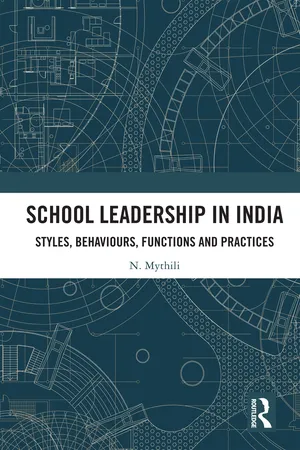
- 360 pages
- English
- ePUB (mobile friendly)
- Only available on web
About This Book
This book explores how school leadership plays a significant role in addressing the issues of poor learning among students in India. It presents in-depth discussions on critical leadership practices that are influenced by the interaction between leadership styles, functions, behaviours and practices of school leaders using theoretical discourse. Besides, a conceptual framework is developed to understand the leadership phenomenon in the Indian context for the overall improvement of schools, student learning and self-development of leaders. While highlighting the issues and challenges faced by schools and school leaders, the book presents a number of vignettes created from the data on various aspects of school leadership practices indicating the styles, behaviours and functions in every chapter. The nature of the analysis is also unique to the discourse on educational leadership as it culminates in tracing the path traversed by the school leaders. The analysis is thematically organised into purpose-process-outcome that spreads across seven chapters. Besides the rigour of vast data that substantiates the arguments using mixed methods, it also vividly discusses the national initiatives undertaken in India to transform instructional and pedagogical leadership of principals and improve students learning in the past one decade or so.
The book will be of interest to researchers of education, leadership education and development and school education in university departments of education, management, public administration, development studies and sociology that use interdisciplinary approaches. It will also be useful for school educators, academicians, school leaders, policymakers and teacher educators not only for teaching and research but also for school leadership development for practitioners.
Frequently asked questions
Information
Table of contents
- Cover
- Half Title
- Title
- Copyright
- Dedication
- Contents
- List of Figures
- List of Tables
- List of Vignettes
- Preface
- Part I School leadership perspectives and practices
- Part II School leadership framework
- Part III Setting a direction for schooling
- Part IV Leading a learning culture in the school
- Part V Impact of school leadership
- Part VI School leadership in the Indian context
- References
- Index